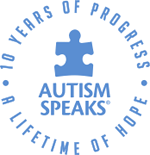Part of the reason I started this blog was to connect with other parents who are in “The Middle World,” one where the autism spectrum exists, but the parents are able to hope their child is not autistic due to an official evaluation from a developmental pediatrician saying that he’s not. So far, I haven’t found many parents who experience the frustrations of having a child immersed in the world of autism but are secretly convinced hoping that their kid will catch up. Which is where Robert and I fall. Here’s the thing about the autism spectrum. It’s huge. It includes symptoms like flapping, echolalia, a need for strict routines, a dislike of physical contact and speech and language delays.
It is quite obvious that Tucker has a speech delay. He doesn’t say as much as typically developing children his age. Which puts him on the spectrum. And yet, he’s extremely loving, enjoys being held, does not have echolalia or a fierce need to stay within the same routine. Which is a relief as, for whatever reason, a speech delay is easier for me to accept than if Tucker didn’t want to be held or had gigantic tantrums because his favorite fruit is not in the same place it always is at the store. But I worry, too. Because the other thing about the spectrum is that it’s not specific. One symptom is self-stimulation (“stimming” includes rocking and flapping). Tucker doesn’t rock or flap, but when he’s tired, he twirls his hair, sometimes to the point of knotting it so badly that I have to cut the piece rather than untangle it. And when one symptom exists, it’s hard not to freak out and wonder if other behaviors that I’ve always chalked up to Tucker being his cute quirky self are actually his form of something on the spectrum. Could hair twirling be considered stimming? Yes. But there are thousands of children who have self-soothing habits such as this who are not on the spectrum at all. Could his refusal to take oral medications be considered a sensory issue, which is also an autism symptom? Yes. Or, it could be that the medicine tastes like shit and he doesn’t like it. Because if it were due to autism, wouldn’t he also refuse to eat funky-feeling foods, like cucumber strips with tons of seeds in them? I have no idea where Tucker falls within the Autism Spectrum Disorder. So many behaviors on the autism spectrum exist in typical kids. Tucker has allergies to cashews, peanuts and rabbits. Do kids who are not on the spectrum also have allergies? Of course they do.
As relieved as I was to hear from his developmental pediatrician that she doesn’t think Tucker is autistic, it’s also frustrating as I can’t help but wonder why he’s speech delayed. Is something else wrong? Could he be retarded? God, I hate that word. But sometimes my brain guiltily whispers it to me anyway, usually when my son is doing something that, well, looks retarded (like jumping like a maniac in bed when he’s really tired).
I suppose in the end it doesn’t really matter whether Tucker is autistic or not. I don’t think he is. If he is, he’s highly-functioning. But I also do not know what else would cause his speech delay, which is why I termed “The Middle World” in the first place. It’s frustrating to not know. It makes acceptance more difficult, as what is it – exactly – that Robert and I are accepting? Perhaps it’s just a speech delay. Maybe that’s what I need to focus on accepting. Because I also realize how very blessed we are. There are so many much worse ailments that parents deal with every day.
School and Applied Behavior Analysis (ABA) are really helping Tucker. He’s talking more. And he’s more confident in doing so. When we began, he’d often whisper new words, as if it were too embarrassing for him to say them outright. Thank goodness that his now teacher, Mrs. M, saw something in Tucker during her initial home visit that made her convince me to give their program a shot. After his official non-diagnosis, I was adamant and outspoken in my belief “but he’s NOT autistic!!!” I had been assured by so many friends and family members that Tucker would talk when he was ready to, that having been at home with me had possibly delayed language development as I’d anticipate what he needed before making him ask for it. And now, I wish I had sought help sooner. We’re so fortunate to have this program available to us. I’ve read about families who go into huge debt to pay for services themselves, sometimes spending $60,000 and more each year. Every single kid who needs early intervention* should receive it. And they don’t. I don’t know how the funding works, or why the federal government doesn’t regulate these services to make it fair. But I do know that spreading awareness about the fact that these services exist and that they work may help other parents demand the same amazing services that Tucker receives. Maybe this post will help to do just that.
*Note that early intervention services are for children less than three years old, which is how we obtained initial speech therapy for Tucker. Once the child graduates from early intervention, they’ll help you transition into the school system for services, which may be school-based, home-based or a combination.






.jpg)









.jpg)
.jpg)
.jpg)
.jpg)
.jpg)
.jpg)
.gif)
.png)
.jpg)
.jpg)
.jpg)
.jpg)
.jpg)
.png)
.jpg)
.png)
.jpg)
.jpg)
.jpg)
.gif)
.jpg)
.jpg)
.gif)

















by Kristi Campbell
Sara - I wonder what the numbers are, exactly how many (what percentage) of kids don’t talk before age 3…or 4, or even 5? I know plenty of anecdotal stories of kids who didn’t talk (or talk very little) before age 4, but what kind of numbers are we really talking about? And while, yes, it’s true that children who have delayed speech sometimes have trouble later (learning to read, or write, or communicate gracefully), that’s only true for SOME kids, and again, I wonder about the numbers. Because I know plenty of anecdotal stories of kids whose speech was delayed but who had no trouble whatsoever learning to read, write, speak gracefully.
If I were unemployed I would definitely go to the library and spend a few hours researching the numbers, but alas, I have a job now…..October 25, 2012 – 7:48 pm
admin - Me, too. Google that and you’ll just get answers like this one: http://www.nytimes.com/2010/02/09/health/09klass.html?ref=health&_r=0
Which isn’t really helpful. Plus, know that Einstein didn’t speak until he was four years old (really) and it makes it harder.October 25, 2012 – 10:14 pm
Sara - In the meantime though, accept that he has speech delays and love him and engage him and read to him and play word games and do all the things you’re already doing. Seems to me you’re doing it right.October 25, 2012 – 7:49 pm
admin - Thank you SO MUCH Sara!!! I hope you’re right….October 25, 2012 – 10:14 pm
Kate - I could have wrote this exact post. Actually I think I did. Cooper sounds a lot like Tucker. Cooper is severely speech delayed but loves to be held, snuggled, tickled. He flaps his arms out of excitement but doesn’t have any other stimming. He hates having his hair cut but so do many other children. I have lost hours of sleep and shed many tears over these same questions. And yes, if Cooper is autistic its high functioning. And Cooper improves every day. But after all that is said, I’m back where I started. Cooper still doesn’t talk and still has frustrating behaviors. My heart breaks for you because I know what you are going through. It’s so scary. It’s lonely and awful. I am so glad I found your post. Your son sounds amazing!January 23, 2014 – 12:55 pm